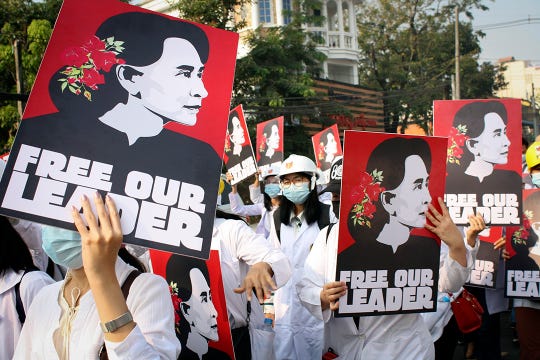BANGKOK — Ethnic Karen guerrillas said they captured a Myanmar army base Tuesday near the border with Thailand, representing a morale-boosting action for those opposing the military’s takeover of the country’s civilian government in February.
Myanmar’s military staged airstrikes several hours later on villages in territory controlled by the Karen forces, said a guerrilla spokesman, a senior Thai official and a relief worker.
A spokesman for the Karen National Union, the minority’s main political group seeking greater autonomy from the central government in Myanmar (also known as Burma), said its armed wing attacked the base at 5 a.m. and burned it down just after dawn.
MYANMAR, VISUALLY EXPLAINED:Hundreds dead in coup, police turn on protesters
Fires burn at a Myanmar military base along the bank of the Salween river, as seen from Mae Sam Laep town in Thailand's Mae Hong Son province, after the base was attacked and captured by the Karen National Union (KNU) on April 27, 2021. (Photo: Handout, KAWTHOOLEI TODAY, AFP via Getty)
Casualty figures were not yet known, the KNU’s head of foreign affairs, Padoh Saw Taw Nee, said in a text message. There was no immediate comment from Myanmar’s military government.
The KNU, which controls territory in eastern Myanmar near the Thai border, is a close ally of the resistance movement against the military takeover that ousted the elected government of Aung San Suu Kyi. Its armed wing is called the Karen National Liberation Army.
‘THE LADY’: Applause for Nobel winner Aung San Suu Kyi turns to criticism
Video shot from the Thai side of the border showed flames rising from the government position on the banks of the Salween River, amid the sound of heavy gunfire. The river marks the border with Thailand.
A report by the Karen Information Center, an online news site, quoted an unnamed villager on the Thai side of the river saying he saw seven government soldiers trying to flee the camp, which is opposite Thailand’s Mae Sam Laep village.
Padoh Man Man of the KNLA’s 5th Brigade, which launched the morning’s attack, said Myanmar’s military carried out airstrikes in the early afternoon, but he did not know how many casualties there were. He described the air raids to The Associated Press as a “heinous war crime” and called for the international community to pressure the junta to stop them.
Sithichai Jindaluang, the governor of Thailand’s Mae Hong Son province, confirmed at a news conference that Karen guerrillas had overrun the Myanmar base and said a woman on Thai soil was wounded by a stray bullet during the morning’s fighting. He said about 450 villagers have been evacuated from Mae Sam Lap for their own safety.
Sithichai also said a Myanmar military aircraft later bombed a Karen village.
Dave Eubank of the Free Burma Rangers, a humanitarian aid group with extensive experience in the area, said he could confirm that there had been airstrikes on Karen villages in two townships in Papun district. He said Myanmar’s army was also staging ground attacks in the area. Neither he nor the governor had casualty figures available.
Fighting between the KNU’s armed wing and Myanmar’s military has been intense since February. Government airstrikes began on March 27.
Medicals students display images of deposed leader Aung San Suu Kyi during a street march in Yangon, Myanmar, Feb. 28, 2021. (Photo: AP)
Myanmar jets have bombed and strafed Karen villages, and its army has deployed fresh battalions to the area, in possible preparation for a large-scale offensive.
Up to 25,000 villagers have fled their homes and are hiding in jungles and caves, according to Eubank.
In response, the KNLA has kept up guerrilla attacks on Myanmar patrols and bases. The KNU has also given shelter to activists against military rule who have fled the government’s crackdown on the resistance movement in the cities.
There is a similar situation in northern Myanmar, where the Kachin minority claims to have captured several government outposts and been the target of air attacks.
The Karen and the Kachin are two of the bigger minority groups that have been seeking greater autonomy for decades, during which there have been periods of armed conflict punctuated by ceasefires.
The city-based resistance movement against the current ruling junta has wooed the ethnic guerrilla groups in hopes that they can form a federal army as a counterweight to the government’s armed forces. A parallel National Unity Government established by elected lawmakers prevented from taking their seats by the army has appointed representatives of several minority groups to ministerial posts.
Source: Read Full Article

